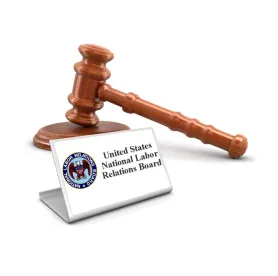On November 4, 2022, the National Labor Relations Board (NLRB) published a notice of proposed rulemaking (NPRM) seeking to rescind the “election protection” rule published on April 1, 2020, and to restore the prior protocols, including holding the processing of an election petition in abeyance if a union files an unfair labor practice (ULP) charge—often referred to as a “blocking charge”—alleging an employer’s interference with the election process. The proposed rule would also provide a mechanism for employees and/or competing labor organizations to challenge an employer’s voluntary recognition of a bargaining representative. A majority of the current Board supports the proposed rule for its protection of employee representation rights. The net effect of the rule, however, may prolong the representation election process and discourage an employer’s voluntary recognition of a bargaining representative when that representative presents evidence that a majority of the employer’s employees support such voluntary recognition.
April 1, 2020, Rule
The final rule published on April 1, 2020, provides an expedited path to processing election petitions and protecting voluntary recognition. Specifically, the NLRB has stated that the rule:
-
“allows representation elections to proceed despite pending unfair labor practice charges alleging [employer interference] with employee free choice”;
-
“allows challenges to the representative status of a union that has been voluntarily recognized … before there has been a reasonable period for collective bargaining”; and
-
“permits election challenges to the long settled representative status of unions representing construction industry employees, despite undisputed evidence of the union’s majority support in detailed language in a collective-bargaining agreement making clear that the employer voluntarily recognized the union based on a showing of majority support.”
November 4, 2022, Proposed Rule
The proposed rule, which the NLRB has termed the “Fair Choice and Employee Voice” rule, has three parts, each of which would rescind a corresponding portion of the April 2020 rule.
Return to ‘Blocking Charge’ Policy
The proposed rule would restore the NLRB’s long-established “blocking charge” policy. If adopted, unions would be able to indefinitely delay representation and decertification elections while a ULP is investigated and litigated. The proposed rule would require employers to refrain from changing any terms and conditions of employment during the “blocked” period. Restoring the blocking charge procedures potentially provides leverage for unions to delay elections, particularly in situations where a union believes the employees might vote against union representation.
Elimination of Notice-and-Election Procedure
According to the NLRB, “the proposed rule would eliminate the required notice-and-election procedure triggered by an employer’s voluntary recognition of a union based on a showing of majority support among employees.” Under the current rule, an employer’s voluntary recognition will not bar the processing of an election petition unless (1) both the employer and union notify an NLRB regional office of the voluntary recognition; (2) the employer posts a notice of recognition informing employees of their right to file a rival union or decertification petition during a forty-five-day window; and (3) no petition is filed within this forty-five-day period. The proposed rule would restore the immediate voluntary recognition bar, meaning that employees who might be unaware of a union’s organizing no longer will have a right to notice of the voluntary recognition or time to challenge the voluntary recognition.
Restoration of Voluntary Recognition Process in Construction Industry
The proposed rule would restore the voluntary recognition process in the construction industry, including “restoring a six-month limitations period for election petitions challenging a construction employer’s voluntary recognition of a union under Section 9(a)” of the National Labor Relations Act (NLRA). One significant change would be that “sufficiently detailed language in a collective-bargaining agreement [could] serve as sufficient evidence that voluntary recognition was based on Section 9(a) of the [NLRA].” Another would be that a union could gain voluntary recognition as the bargaining representative of employees under Section 9(a), which protects the union’s long-term representative status. This would be a major change to construction industry employers accustomed to operating under Section 8(f) “pre-hire” agreements in which a union’s representative status does not survive the contract’s expiration.
Next Steps
Comments on the proposed rule must be submitted on or before January 3, 2023, with replies to such comments submitted by January 17, 2023. If the proposed rule is adopted, the NLRB will likely finalize the rule shortly after the notice-and-comment period ends.





 />i
/>i
